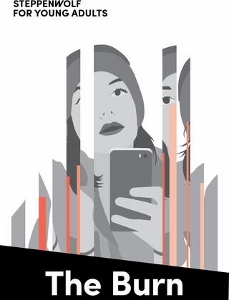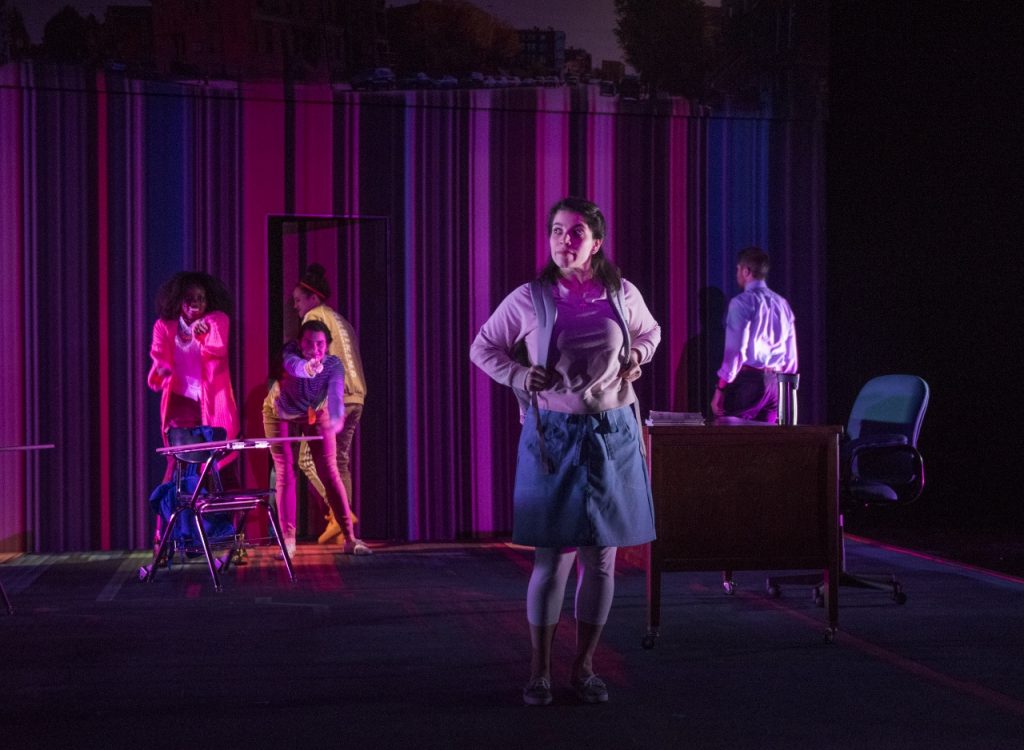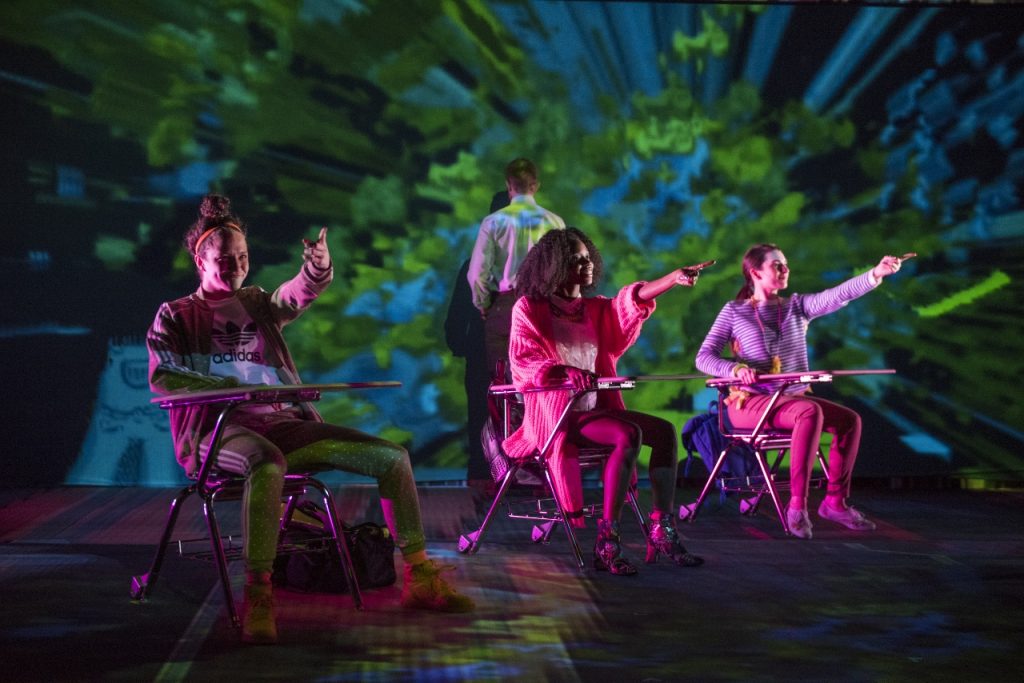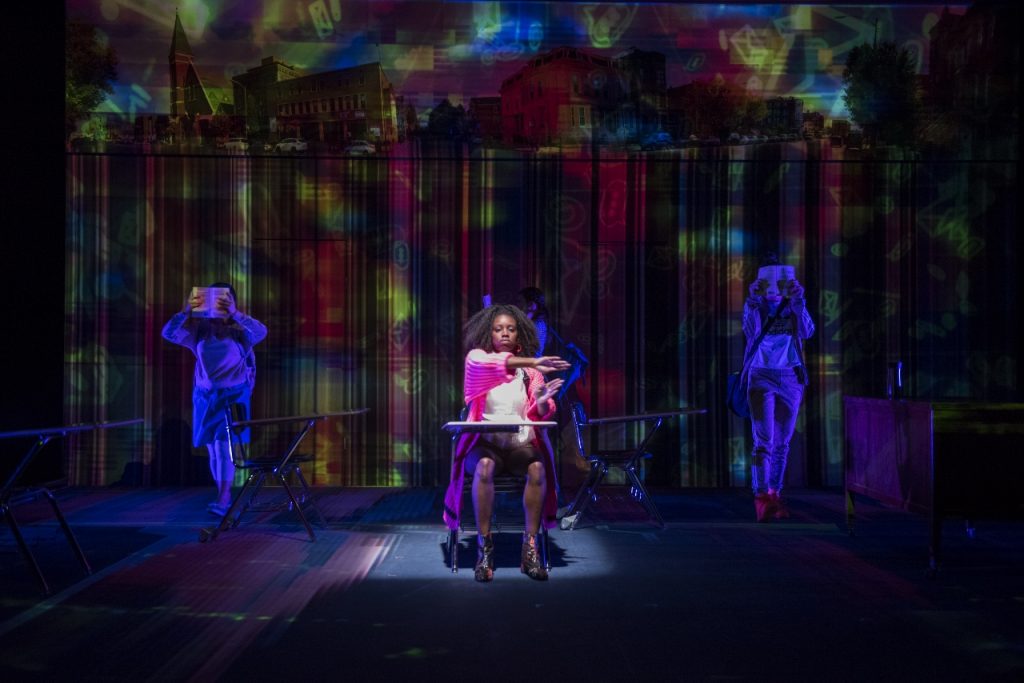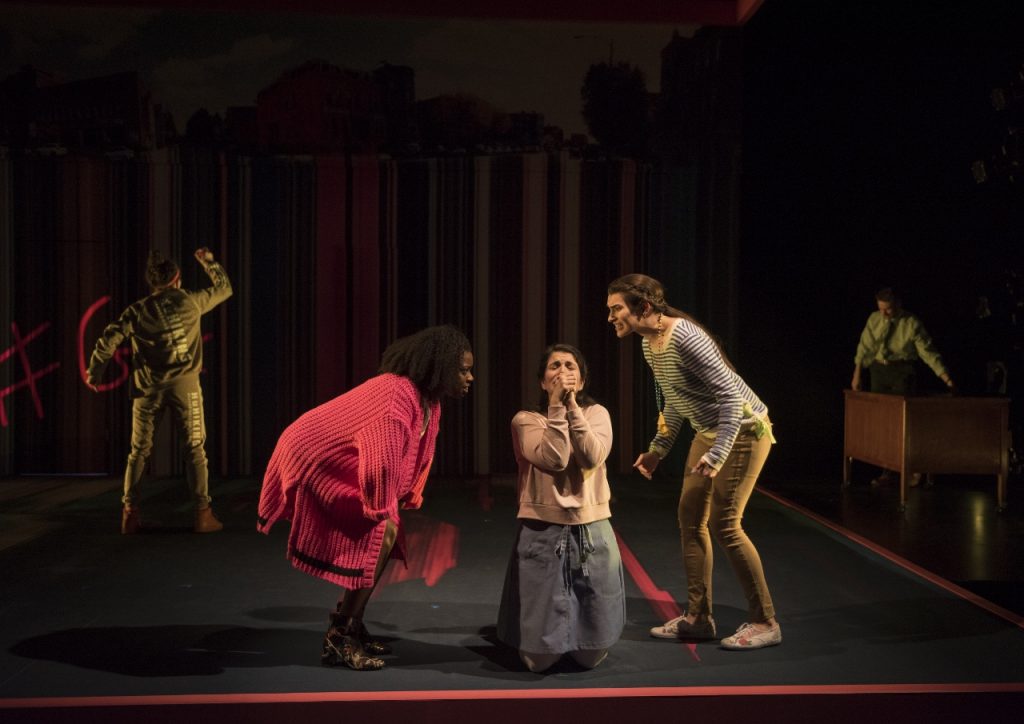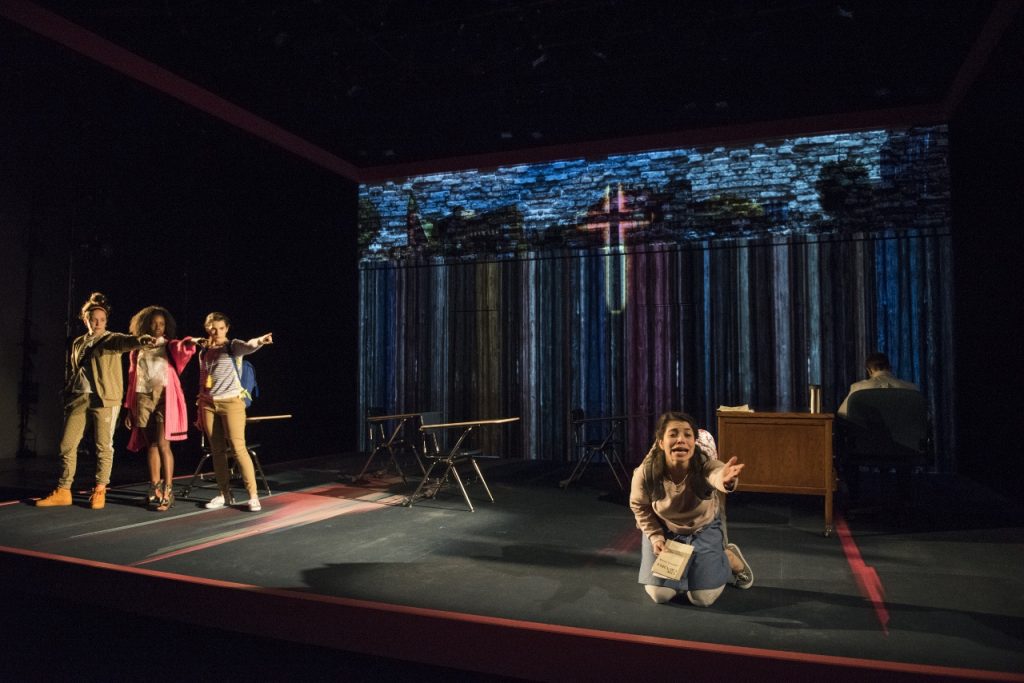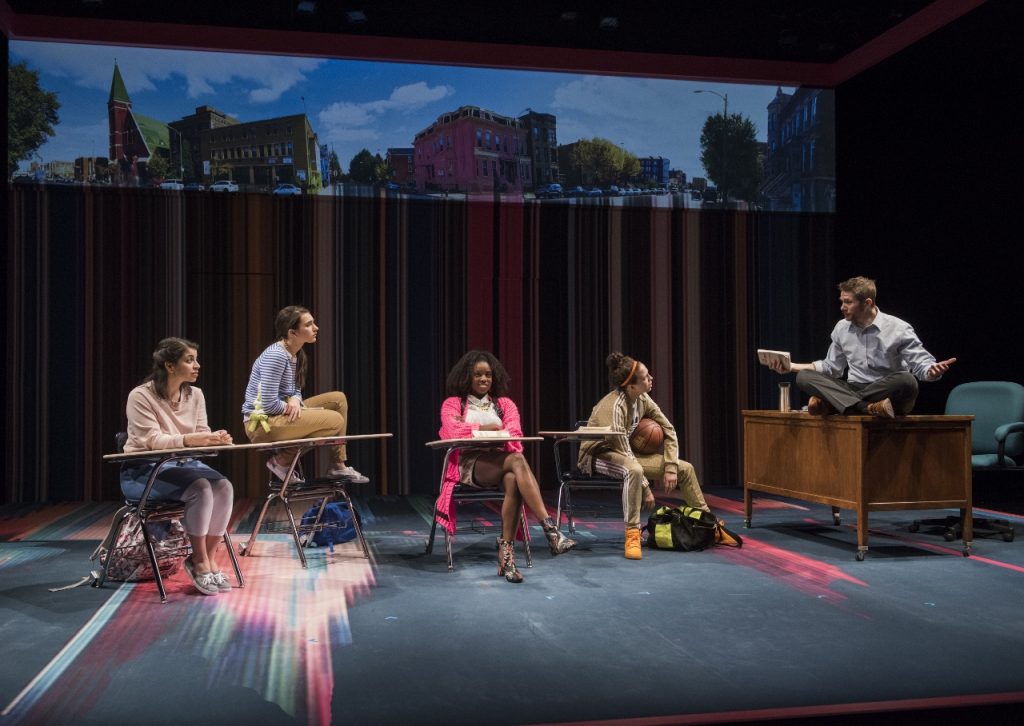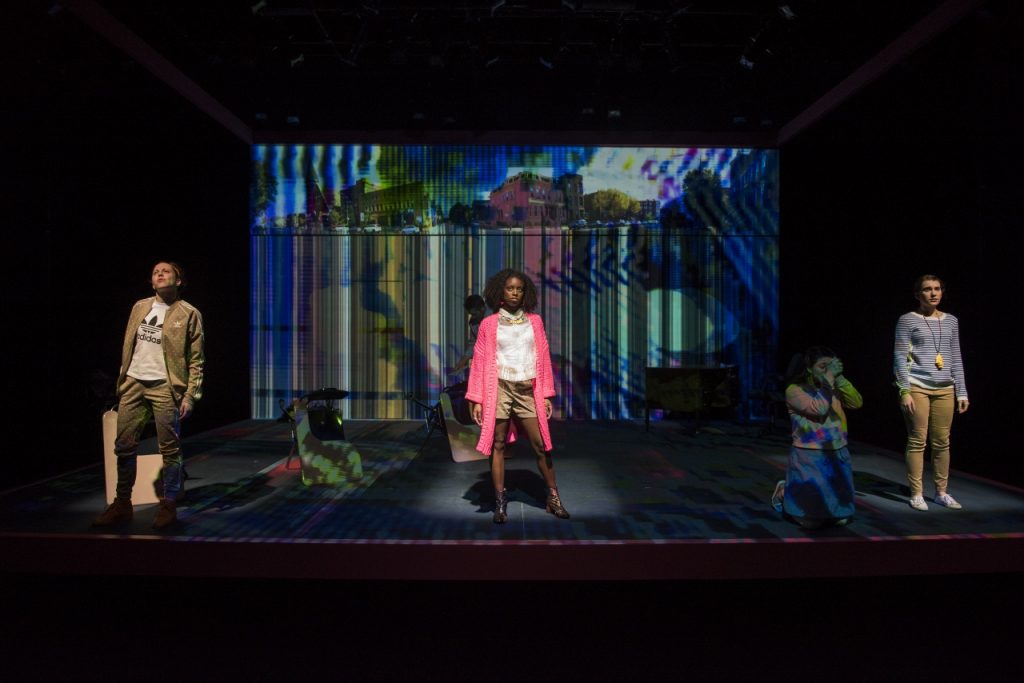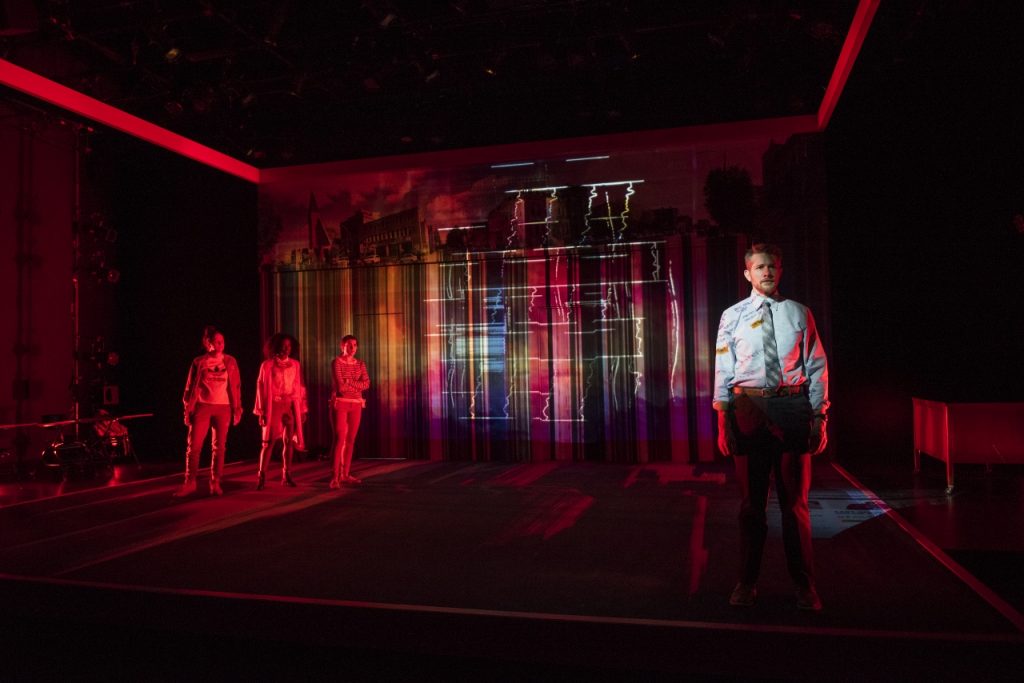IN CYBER SPACE NO ONE CAN HEAR YOU SCREAM
On the Internet or just IRL, there’s joy in striking back — turning the tables and trolling the bullies. But what’s rotten one way is no better when reversed. That’s one of many toxic lessons in The Burn, a useful and even redemptive cautionary parable from Philip Dawkins, a proved and promising young Chicago playwright.
A world premiere from Steppenwolf for Young Adults, The Burn is a concentrated 90-minute depiction of Web-wicked bullying and the human wreckage that results. And it’s staged with appropriate sensory overload by Devon de Mayo, with projections by Rasean Davonte Johnson that cunningly contrast screens and souls.
The wonder of his work is how carefully Dawkins balances the blame. What could have been a one-sided, black-and-white portrait of innocence corrupted by gratuitous malice takes on surprisingly nuanced textures. Computers, after all, are intrinsically neutral servers that can help or harm. Its operators, of course, are a different matter ’” so true fixes can’t come easily.
No blandly sincere, public-access, “after school special,” The Burn powers past clichés to expose the limits of privacy, free speech and even honesty itself. These supposed goods can, we know, be distorted, abused and weaponized by anonymous or “owned” confrontations on Facebook, Instagram, Snapchat and the like. It’s happening right now IRL.
Adolescents are as insecure as cave kids 20,000 years ago. Mean girls, alas, are forever. But, where a half century ago gossip, slander and smears had a shelf life limited by letters and phone calls, today hate –organized or improvised — finds outlets that last longer and spread further. Whether driving human sacrifices to suicide, breaking spirits by bad-mouthing bodies and behavior, backstabbing, blackmailing, and blaming the victims, the World Wide Web puts spiders to shame. Cyber scum face no expiration date. The aphorism “Sticks and stones can break my bones but words will never hurt me” clearly predates the Internet.
For teens ’” this show’s target but hardly the only qualified audience — Dawkins’ parable of payback plows familiar ground. The setting is a Chicago high school. The fertile situation is a drama teacher’s revival of The Crucible (appropriately produced last year as part of Steppenwolf’s Young Adults series).
Condemning the anti-Communist purges of the Eisenhower Era, Arthur Miller’s timely/timeless 1953 recreation of the Salem witch trials is fueled by the hysteria of teenage girls supposedly possessed by devils sent by sorceresses. This 1692 eruption of civil discord forces the villagers ’” specifically the fallible farmer John Proctor — to defend their “name” (a big word meaning more than reputation). Will he refuse to succumb to persecuting paranoia or lie to save his life and wife? In a classic case of art imitating life, in 2018 reenacting Salem’s fear-mongering and panic-peddling triggers a disastrous feedback loop. Everything old (and ugly) is new again (and still ugly).
Erik Hellman, a superbly grounded truth-teller, brings entrenched authenticity to anyone he plays. Here he’s also Erik ’” specifically, Mr. Krawacek, a frustrated actor-turned-theater teacher with a history of addiction that he half-heartedly hides. Coping with the hand-held distractions of his multi-tasking (as in attention-deficit) students, Mr. K. soon sees that four teenage girls have created a potential killing ground in his own classroom.
Two of the young women are led by snide and sarcastic Tara (Birgundi Baker), a ferally ambitious popular girl (and opportunistic plagiarist) from a broken family. Boldly confronting her teacher’s anger at her abuse of the Internet, this passive-aggressive, professionally innocent instigator explodes in a self-serving protestation of honesty as her only policy: If weak wimps can’t take her truths, don’t blame the teller. Always litigating with logic, our demurely designing woman is furious at Mr. K. for refusing to be her Facebook friend. Smart as she is, our Queen of Mean is clueless about why her teacher isn’t happy to share in Tara’s self-promoting visibility, broadcast on all frequencies, like the rest of the world.
Tara’s most ferocious follower is Andi (Nina Ganet). Defensively Jewish, eager to enable, she’s a basketball-dribbling slacker. Less conforming to Tara’s cult of cool cruelty, well-meaning Shauna (Dyllan Rodrigues-Miller) represents teens who, afraid to become collateral damage, nonetheless get caught in the crossfire. “LOL” if you dare.
Finally, there’s the quiet outsider who sticks out in the worst way ’” home-schooled, deeply religious Mercedes. Dismayed to discover that her recently murdered brother was a gang member, this true believer clings to God, repudiates the Internet, and, to their dismay, prays for those around her. The classic odd girl out, Mercedes will portray the pivotal part of Abigail in the play, anguished, homeless and capable equally of good and evil. “Déjà vu” is not just a plot device.
Slowly discovering that Mercedes is more than a Bible-thumping bigot, Shauna starts to warm to the shy misfit’s open-hearted vulnerability. But, no BFF, Shauna is forced to take sides when Andi imprudently graffiti-tags “#GodHatesMercy” on a school wall. When Shauna fatefully introduces Mercedes to Instagram, the now-“woke” girl discovers the venomous posts directed against her. In a major misunderstanding, she also blames Shauna for the character assassination.
This flurry of false facts and alternative realities unleashes the aforementioned vengeance, with one bottom-feeding wrong topping another. Unsurprisingly, the revenge backfires: By play’s end at least one life is ruined before turning 18. Yes, it’s a real “OMG!”
It’s fascinating how The Burn forces real life and screen time to overlap: The video-enhanced cross-talk is regularly interrupted when a character “has left the conversation.” No easy expose of the horrors of harassment, The Burn (its title referring to a cyber attack even the Russians would envy) more than meets a young audience half way. Ms. de Mayo inspires instantly familiar, totally tensile performances from her skilled quintet. Audiences ’” both ripe and mature — will be galvanized by Dawkins’ shocks of recognition because, scalding and stinging, The Burn is an equal-opportunity injury.
photos by Michael Brosilow
The Burn
Steppenwolf for Young Audiences, Upstairs Theatre, 1650 N. Halsted St.
public performances: Feb 23 at 7:30; Feb 24 at 3 & 7:30;
March 2 at 7:30; March 3 at 3 & 7:30
ends on March 10, 2018 (Relaxed/Sensory-Friendly Performance)
for tickets call 312.335.1650 or visit Steppenwolf
for more shows, visit Theatre in Chicago
